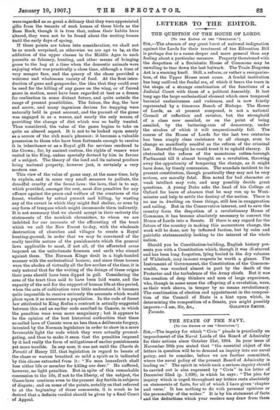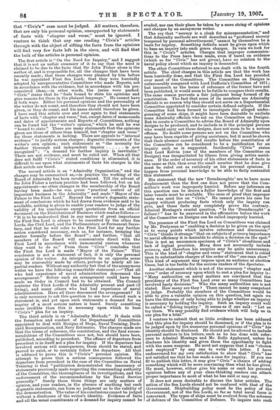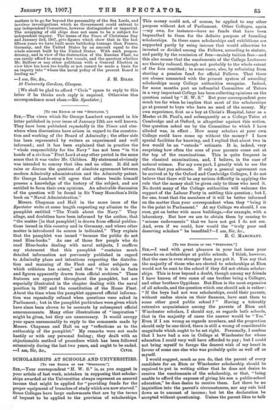THE STATE OF THE NAVY.
[To TEE EDITOR OD TEl ..SPECTATOR."] 818,—The inquiry for which " Civis" pleads is practically an impeachment of the Naval Lords of the Board of Admiralty for their actions since October 21st, 1904. In your issue of November 10th you stated that "the essential object of the letters in question will be to demand an inquiry into our naval policy,. and to consider, before we are further committed, where the naval policy of the present Board of Admiralty is leading us." The spirit in which such a serious inquiry should be carried out is also expressed by "Civic" in his letter of December 22nd (p. 1,038), in which lie says " The plea for inquiry which is urged throughout my letters rests absolutely on statements of facts, for all of which I have given 'chapter and verse.' It has nothing to do with personal opinions or the personality. of the writer." It is by his statement of facts and the deductions which your readers may draw from them that " Civies " case must be judged. All matters, therefore, that are only his personal opinion, unsupported by statements of facts with "chapter and verse," must be ignored. I venture to think that any one reading "Civis's" articles through with the object of sifting the facts from the opinions will find very few facts left in the sieve, and will find that the bulk of the articles is personal opinion.
The first article is " On the Need for Inquiry," and I suggest that it is not an unfair summary of it to say that the need is claimed to be due to the facts that Sir John Fisher alone is the author of, and is responsible for, all the changes that have been recently made ; that these changes were planned by him before he was appointed First Sea Lord ; that they were hurriedly adopted by unrepresentative Committees who made Reports, not in accordance with the evidence, but in accordance with his pre- conceived ideas,—in other words, the juries were packed. " Civis " states that he "feels bound to state his opinions and give reasons for them in the plainest language." He cannot have it both ways. Either his personal opinions and the personality of the writer do not count, and therefore they should not have been given, or they do count, and his name should therefore be given. I have read this article over and over again to find statements of facts with "chapter and verse," but, except dates of memoranda and dates of appointments and Reports of Committees, nothing can be found but the " writer's opinion," which he said he was " bound to state." There are many statements that the opinions given are those of others than himself, but "chapter and verse" for these statements is lacking. There are appeals to "internal evidence" to justify serious charges ; dogmatic statements of the writer's own opinion ; such statements as "the necessity for
further thorough and independent inquiry is now recognised" ; " a demand for further inquiry is inevitable." These are not evidence, and must be ruled out. When all that does not fulfil "Civis's" stated conditions is eliminated, it is difficult to see upon what statements of facts his charges in the first article are based.
The second article is on "Admiralty Organisation," and the charges may be summarised as,—in practice the working of the Board of Admiralty has been revolutionised. Till the advent of Sir John Fisher a certain practice had been followed, but on his appointment—no other changes in the membership of the Board having been made—he was given "practical control of all important business in the Admiralty" and made "Mayor of the Palace to the First Lord." Beyond the writer's dogmatic state- ment of conclusions which he had drawn from evidence said to be available, nothing is given to enable your readers to judge of the validity of his conclusions except quotations from an official document on the Distribution of Business which read as follows :— "It is to be understood that in any matter of great importance the First Sea Lord is always to be consulted by the other Sea Lords, the Civil Lord, and the Parliamentary or Permanent Secre- tary, and that he will refer to the First Lord for any further action considered necessary, such as, for instance, bringing the matter formally before the Board" ; and further, "that all members of the Board will communicate direct with the First Lord in accordance with immemorial custom whenever they want to do so." From these "Civis" concludes that the First Sea Lord is made "Mayor of the Palace." This conclusion is not a statement of fact, it is only the personal opinion of the writer. An interpretation in an opposite sense may be reasonably made by others, perhaps by nearly all im- partial readers. Without any authority but that of the anonymous writer we have the following remarkable statement :—" That all who had experience of naval administration denounced the arrangement." Before such an arrangement could have been made an Order in Council had to be obtained. The Council contains the First Lords of the Admiralty present and past (if living), and many others who had had experience of naval administration. Have all these denounced the arrangement? It is only necessary to ask this question to see how absurd such a statement is, and yet upon such statements a demand for an inquiry of a most serious nature is based. Surely something more credible than this is necessary upon which to base " Civis's" plea for an inquiry.
The third article is on "Admiralty Methods." It deals with the formation and conduct of the Departmental Committees appointed to deal with Designs of Ships, Naval Training, Dock- yard Reorganisation, and Navy Estimates. The charges made are that the terms of reference, the constitution, and the final recom- mendations of the Committees were not,.but should have been, published, according to precedent. The offence of departure from precedent is in itself not a plea for inquiry. If the departure has involved serious evil consequences, these should be stated, and proved to exist, or to certainly follow the departure. All that is adduced to prove this is "Civis's" personal opinion. His attempt to prove that a serious consequence followed the departure from precedent in the case of the Committee on Naval Training is that "publication demonstrated the inaccuracy of statements previously made respecting the commanding authority of the Committee, the thoroughness of its investigations, and the endorsement of the recommendations by the Naval Service generally." Surely these three things are only matters of
• opinion, and your readers, in the absence of anything but such dogmatic statements, can form no judgment as to the validity of the demonstration. The value of his conclusions cannot be judged without a disclosure of the writer's identity. Evidence of facts and all the usual constituents of a demand for inquiry cannot be evaded, nor can their place be taken by a mere string of opinions and charges by an anonymous writer.
The cry that "secrecy is a cloak for misrepresentation," and that Admiralty methods are well described as "professed secrecy tempered by personal advertisement," cannot by themselves be a basis for inquiry. Something definite must be given upon which to base an inquiry into such grave charges. In vain we look for this in ." Civis's' articles. Charges that improper communica- tions to the Press have been made, even if based on evidence (which so far "Civis" has not given), have no relation to the naval policy about which an inquiry is demanded.
The other Committees referred to are dealt with in the fourth article. The chief charges in this article are that the work has been hurriedly done, and that the First Sea Lord has presided over most of the Committees. The Committee on Designs is unfavourably compared with Lord Dufferin's Committee of 1871; but inasmuch as the terms of reference of the former have not been published, it would seem to be futile to compare their results. The same reason prevents a fair judgment being formed of its constitution. The fact that some of its members are Admiralty officials is no reason why they should not serve on a Departmental Committee appointed to consider certain defined subjects. If the Committee had been formed to investigate the alleged under- gunning of some ships, it might have been desirable to exclude some Admiralty officials who sat on the Committee on Designs. But to create a Committee to advise the Board of Admiralty upon designs to be produced, and to include in it the principal persons who would carry out these designs, does not seem to be a serious offence. No doubt some persons are not on the Committee who may have been capable of giving assistance, but it must be shown that their absence caused bad results before the constitution of the Committee can be considered to be a justification for an inquiry such as is suggested. Incidentally "Civis" states that Lord Kelvin (one of the members of the Committee on Designs) was incapacitated by illness from giving active assist- ance. If the order of accuracy of his other statements of facts is the same as this, then even the small number that he does give must be ruled out as ruthlessly as his personal opinions. I happen from personal knowledge to be able to flatly contradict this statement.
His statement that the new' Dreadnoughts' are to have more displacement than the first one does not prove that the Com- mittee's work was improperly hurried. Before any inference on this question can be drawn a fuller knowledge of the first and later vessels must be available. The onus of proof that improper haste was used lies on "Civis." He cannot prove his case for inquiry without producing facts which only the inquiry can give, and these facts may completely prove the contrary. Admiral Montagu's crucial question, "Is the 'Dreadnought' a failure ? " has to be answered in the affirmative before the work of the Committee on Designs can be called improperly hurried.
The presence of the First Sea Lord on Committees was claimed by Mr. Pretyman as " enabling a decision to be given on the spot as to many points which involve reference and discussion." " Civis " thinks it strange "that on subjects of primary importance to naval efficiency it is desirable to obtain a decision on the spot." This is not an uncommon specimen of "Civis's" cloudiness and lack of logical precision. Many does not necessarily include primary, and therefore his surprise may be quite unnecessary. This is the kind of "chapter and verse" statement that is relied upon to substantiate charges of the order of the "one-man show." This kind of argument may impose upon an audience at election times, but is too feeble for the serious readers of the Spectator.
Another statement which is not of the necessary "chapter and verse" order of accuracy upon which to rest a plea for inquiry is "Many authorities on naval matters are convinced that the presidency of the First Sea Lord over so many Committees has involved hasty decisions." Who the many authorities are is not stated. How many are they ? There cannot be many competent to judge. Probably the members of the Committees would be able to give a valuable opinion on this question, but again we have the dilemma of only being able to judge whether an inquiry is necessary by holding the inquiry. Such an inquiry could well be called a "fishing inquiry." It seems as if one said "Let us try them. We may possibly find evidence which will help us in our plea for a trial."
I venture to submit that so little evidence has been adduced that this plea for inquiry should be dismissed, or if the plea is to be judged upon by the numerous personal opinions of "Civis" his identity should be disclosed. He should not be allowed to include personal matters in his letters, such as he has done with refer- ence to Admiral Montagu and Mr. Rollo Appleyard, unless he discloses his identity and gives them the opportunity to fight with the same weapons. He need not suppose that I am "chosen and employed" by any one to write this letter. I have endeavoured for my own satisfaction to show that " Civis" has not satisfied me that he has made a case for inquiry. If you see fit to publish this letter, it may give "Civis" a chance of adding something which will be more convincing than what he has given. He must, however, either give his name or omit his personal opinions before any of your clear-thinking readers can attach proper importance to most of what he has said or may say.
It does not seem desirable to discuss the later articles. The action of the Sea Lords should not be confused with that of the Government. Shipbuilding policy must be the policy of the Government, not of the Sea Lords, so far as total naval force- is concerned. The types of ships must be evolved from the schemes of defence of the Committee of Defence. To inquire into such
matters is to go far beyond the personality of the Sea Lords, and involves investigations which no Government could entrust to any independent Committee, however distinguished or impartial. The scrapping of old ships does not seem to be a subject for independent inquiry. The issues of the Times of Christmas Day and January 2nd, 1907, give figures which show that in the last fifteen years we have built more battleship tonnage than France, Germany, and the 'United States by an amount equal to the whole amount built by the United States. With such prepon- derancy, and in view of the destruction of the Russian Fleet, we can surely afford to scrap a few vessels, and the question whether Mr. Balfour or any other politician with a General Election in view blew his horn too loudly or not cannot be made a basis for an inquiry into "where the naval policy of the present Board is leading us."
10 University Gardens, Glasgow.
[We shall be glad to afford " Civis" space to reply to this letter if he thinks such reply is required. Otherwise this correspondence must close.—En. Spectator.]








































 Previous page
Previous page